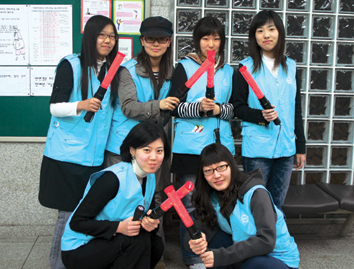
Ewha is usually considered a safer place to study for female students than a coeducational university. However, two incidents or sexual harassment have occurred during this semester, making Ewha students anxious.
Once at the
Koo Hee-eon (Journalism, 2) also expressed her worries, “For students who live in the school dormitory, it is a little bit scary to walk alone even if it isn’t dark, since only a small number of people are walking around and there’s a possibility of meeting a pervert who is hiding in the bushes. Actually, a similar case happened last year.”
“Until the mid-90s, men weren’t allowed to enter Ewha unless they got permission at the front gate; however Ewha has become fully open to the public, allowing the residents and male students to enter freely,” says Kim Yong-wan, the head of General Affairs. “From then on, Ewha has put more effort into protecting Ewha students and preventing bad incidents from happening.”
Currently, there are 120 security guards working at Ewha, 60 guards work each day. Security guards usually patrol the buildings during the daytime, and shut all the doors except the main door of each building, where the guardroom is located so that they can check who is entering the building. Every guard also makes a round of inspection inside the building every hour until
“The school’s night duty officers keep a strict watch for strangers in school, especially around the North A-Hyun Gate, Hanwoori Hall, the
Currently, there are also about 470 CCTVs set up around the gates and elevators of 30 school buildings to prevent theft and other security problems, and 480 – 490 outdoor lamps around campus. Park Il-young of the Office of General Affairs said that the school is planning to set up CCTVs outside of the buildings as well after the completion of the
However, Kim stressed that students should be aware of their own safety. Since most security guards have not worked long at Ewha, they find it hard to distinguish the strangers. “Because of the increase in young male professors and male exchange students, it is hard to know whether someone is a stranger or not. It is a highly sensitive matter because a misjudgment can raise discomfort and hurt someone’s feelings,” said Kim.
Kim strongly urged Ewha students not to stay alone in empty classrooms. “The two recent incidents happened inside the building, not outside. Being alone in an empty classroom is like exposing oneself directly to the hazard. Problems inside are also much more difficult to notice unless students shout out loud for help,” says Kim.
Kim also recommended talking the school shuttle bus, which runs from
Meanwhile, the Student Affairs Office has established the Ewha Campus Guard, a volunteer student group which currently consists of 24 Ewha students, to instill on-campus safety consciousness among Ewha students. Since March 27, student guards have patrolled four courses in remote areas around campus from 7 p.m. to 10 p.m. Each course is a 40-minute walk, and the student guards are asked to write short comments about how things were going at each checkpoint they are assigned to visit. Student guards are paid 5,000 won per hour as a part of their school intern scholarship.
The student guards always wear guard vests and hold flashlights during patrol so that they can be visible in the dark. Also, they always carry pepper spray and personal alarms for protection. Two students or more always patrol together, as the student guard herself can be in danger. “I don’t feel much fright during patrolling because at least two students patrol together; however, I sometimes get afraid when passing certain areas such as the Engineering Building, where almost no one walks by at night,” says Koo Hee-eon.
“We always keep an eye on the student guards as well since they are students after all,” says Professor Lee Yong-hah (Mathematics Education), the vice-dean of Student Affairs. Professor Lee adds, “We guide strict instructions to student guards, which include rules to avoid danger. All the student guards learn these rules before they start patrolling around the campus, so they can act immediately and properly if they encounter dangerous situations.” Student guards are required not to intervene carelessly in emergency situations, but to call security guards or night duty staff right away if emergencies occur.

